About Us
Members Enjoy 10% Off Storewide – Sign In to Save Instantly!




Nov 2024

Let’s hear from experienced teachers on how daily practice helps to boost pupils’ Chinese language learning.
Nov 2024 | By EPH Editorial Team
Consistent daily practice plays a vital role in mastering the Chinese language as it helps integrate different language skills for pupils to apply more effectively and naturally. Experienced Chinese teachers 周雨彤老师 and 李雅洁老师, author of P1B Chinese Daily Intensive Practice ($13.90) and P1 Daily Dose of Chinese ($17.90) respectively, share with us their views on this.
Q How can consistent daily practice improve pupils’ Chinese language?
周老师: Research has shown that, to retain information, we need to view and revise the material between five to seven times. Thus, consistent daily practice is exactly what a pupil needs to obtain a better grasp of the language. To help pupils learn and apply, we as teachers also need to provide the essential scaffoldings and create opportunities to support their growth.
李老师: Language learning is a cumulative process that requires continuous input, especially for beginning learners, thus daily practice is essential. My pupils showed improvement and grew confidence in their language usage after spending just 5 to 10 minutes studying Chinese every day.
Q What are the other key benefits of daily practice?
李老师: Daily practice not only enhances pupils' input for language acquisition, but it also allows pupils to review content when their memory curve drops. Furthermore, it helps develop good study habits and reduce the inertia of doing homework by incorporating regular blocks of study time into their daily schedule.
Q How can parents support their child during daily practice?
周老师: Daily practice is a skill-building exercise for pupils to reinforce their learning. Parents should allow their child to make mistakes and create organic opportunities for them to pick up new language skills consistently and steadily.
李老师: At lower primary levels, it is necessary for parents to patiently guide their child on the requirements and address any difficulties they may encounter. Parents can also help create a non-distracting environment for their child during revision.
Q How is your book structured to support daily practice, and what makes this approach effective for pupils?
周老师: P1B Chinese Daily Intensive Practice covers the four essential components of language learning, namely listening, speaking, reading, and writing. The ratio of challenging to easy questions is relatively balanced, which means it challenges pupils without undermining their confidence in their daily practice. The wide use of illustrations, nursery rhymes, as well as age and level-appropriate vocabulary and passages also makes it a fun and useful language book for both parents and children.
李老师: P1 Daily Dose of Chinese is designed based on the new syllabus textbook, and each lesson is written in order, from Pinyin to words, phrases, sentences, and dialogues. Each lesson content is relevant to pupils’ daily lives and within the appropriate difficulty level. It is also well-structured for parents to help their child consolidate what they have learnt daily.
Aug 2024
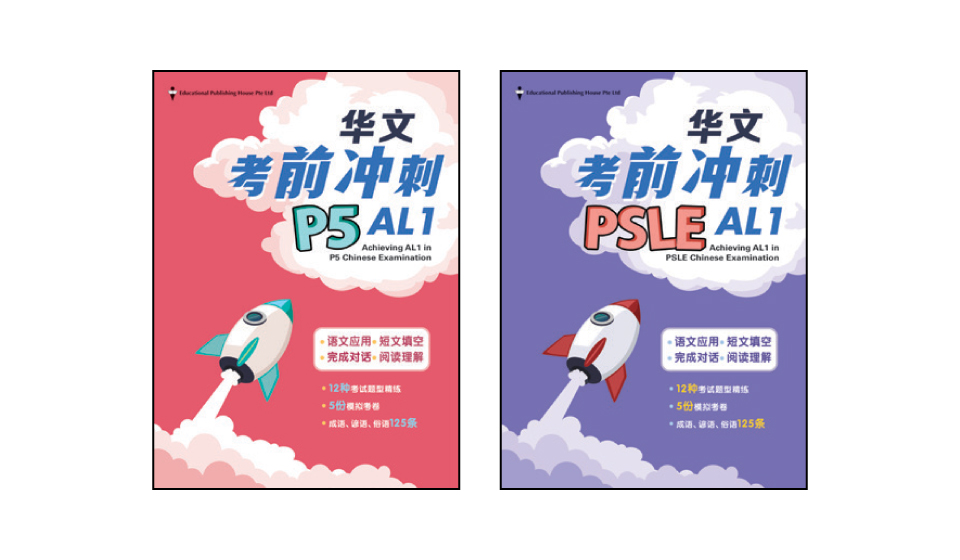
With the PSLE Chinese Paper 2 fast approaching, it’s time to shift into high gear to clinch your desired AL1.
Aug 2024 | By EPH Editorial Team
The PSLE Chinese examination consists of Composition Writing (Paper 1), Language Usage and Comprehension (Paper 2), and Oral Communication and Listening Comprehension (Paper 3). Among the three, Paper 2 accounts for almost 50% of the total score. Therefore, it is of utmost importance to master the different examinable components of Paper 2. Here are three practical steps to guide you towards attaining AL1 in your examination.
1 Understand the Examination Format
Familiarise yourself with the various components of Paper 2. Each component tests your understanding and proficiency in different language skills. To tackle each examinable component confidently, it is important to have a thorough understanding of what will be tested.
For instance, 拼音选择 tests your ability to differentiate between similar-sounding beginning consonants and vowels(声母、韵母和声调).

On the other hand, 辨字选择 tests your ability to recognise and differentiate between words that are alike in form (形似字) or sound (音似字).

2 Practise Regularly
Set a regular study schedule to cover the different components of the examination. You should start your revision with unit reviews or topical exercises which cover a wide range of components, before moving on to mock examination papers. The topical exercises will help you to master different answering techniques, as well as give you a feel of how to handle questions of various difficulty levels. To fully prepare yourself, attempt exercises or mock papers under examination conditions.
3 Create Study Notes
Consolidate key concepts, notable vocabulary, and sample sentences into comprehensive study notes. Having concise and organised notes facilitates quick recall during revision. Regularly review and update your notes to reinforce your learning and to ensure that the information stays fresh in your mind.
Scoring good grades for the PSLE Chinese Paper 2 examination is entirely achievable. By following the above steps, you are one step closer to reaching your goal. To supplement your learning, you may refer to Achieving AL1 in Chinese Examination (P5/ PSLE) ($12.90 each) from Educational Publishing House. This series closely aligns with the MOE Chinese syllabus, as well as the PSLE Chinese Paper 2 examination format. It also contains study tips and useful notes for effective revision. With this series, you will be on your way to achieving success in your Chinese Paper 2 examination.
May 2024
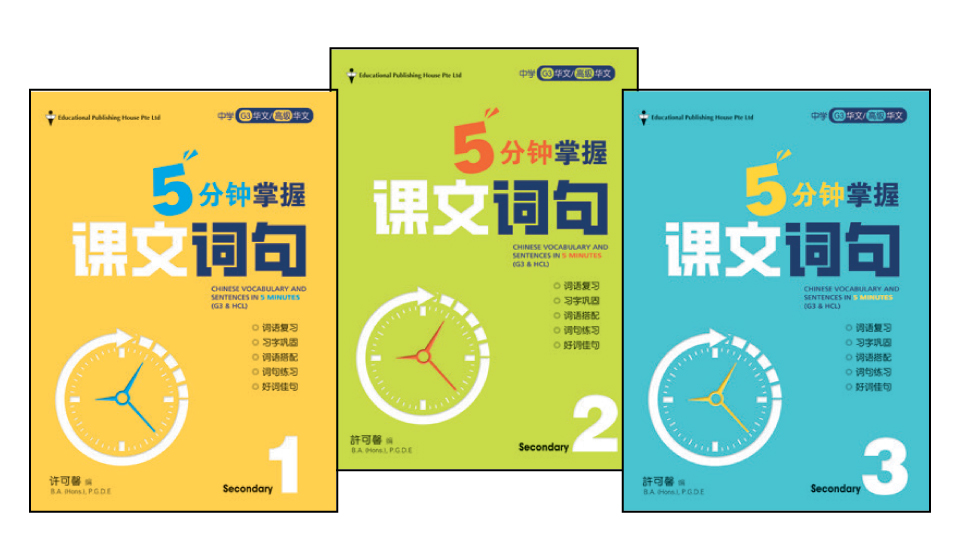
Follow these five steps consistently and gradually expand your Chinese vocabulary over time.
May 2024 | By EPH Editorial Team
Expanding your Chinese vocabulary at Secondary levels involves a combination of systematic study, practice, and exposure to the language in various contexts. Here are some effective steps to help you achieve this.
1 Practise Writing Vocabulary Words
Writing by hand has a positive impact on vocabulary learning. Writing practices will reinforce the learning of new Chinese vocabulary and strengthen retention in the long run.
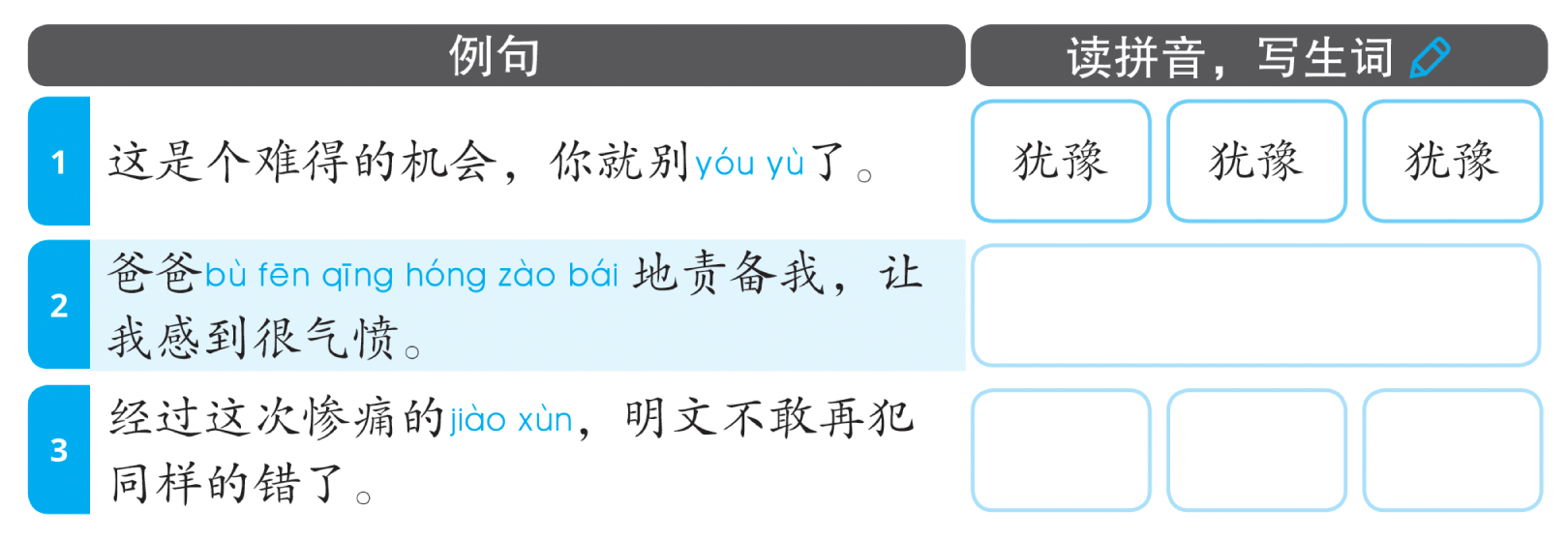
2 Master Word Collocations
Word collocations — two or more words that are often used together — are an essential part of the Chinese language. Learn to form and build phrases from individual vocabulary words. By accumulating collocations and exploring various word combinations, you can enhance your ability to comprehend a diversity of Chinese phrases and idioms. This skill is especially useful when it comes to constructing longer sentences and tackling cloze passage exercises.

3 Attempt Vocabulary Drills
Vocabulary exercises play a crucial role in language learning. Expose yourself to a variety of exercises that test not only individual words but also phrases and sentences. By encountering words in different contexts and familiarising yourself with their usage, you can strengthen your vocabulary effectively and build confidence.
4 Immerse in Chinese Culture
Make an effort to actively participate in Chinese cultural events or immersion programmes. Doing so not only exposes you to more vocabulary words but also deepens your understanding and appreciation of the language.
5 Stay Consistent and Persistent
Language learning takes time and dedication. Make a habit to study and practise Chinese regularly. Consistent learning is the key to long-term progress and the accumulation of Chinese vocabulary.
To supplement your learning, you may check out the Secondary Chinese Vocabulary and Sentences in 5 Minutes series ($13.90 each) from Educational Publishing House. This series closely aligns with the MOE Secondary Chinese textbook and serves as the ideal learning companion for students doing self-revision. Its comprehensive exercises also make it the perfect supplementary material for teachers to use in class. Equipped with this series, you will be on your way to accumulating and expanding Chinese vocabulary words effectively.
Mar 2024
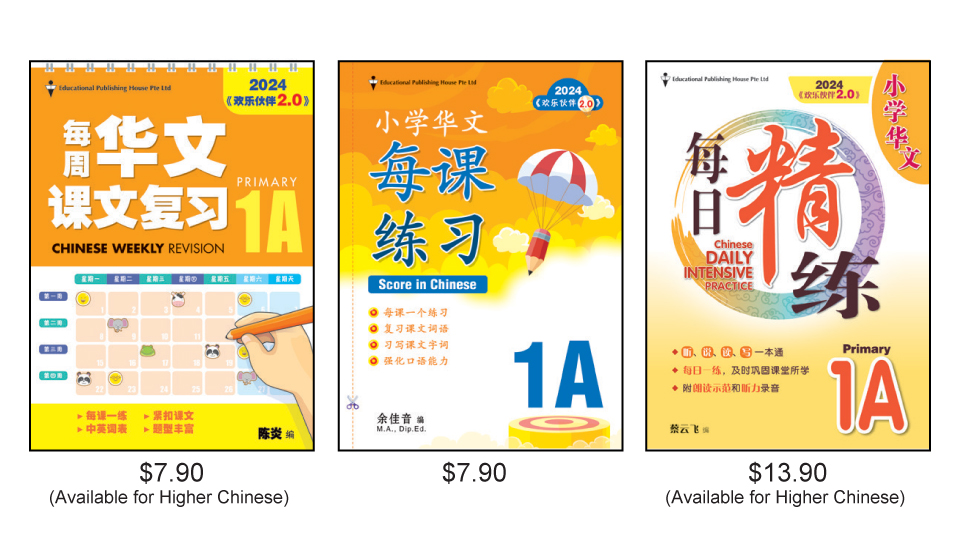
How does this new syllabus compare with the old one?
Mar 2024 | By EPH Editorial Team
2024 sees a new Primary 1 Chinese syllabus being introduced, with《欢乐伙伴2.0》adjusted and modified based on the 2015 Chinese textbook《欢乐伙伴》. Several major changes are reflected in the new Primary 1 Chinese Syllabus, which we have highlighted in the table below.
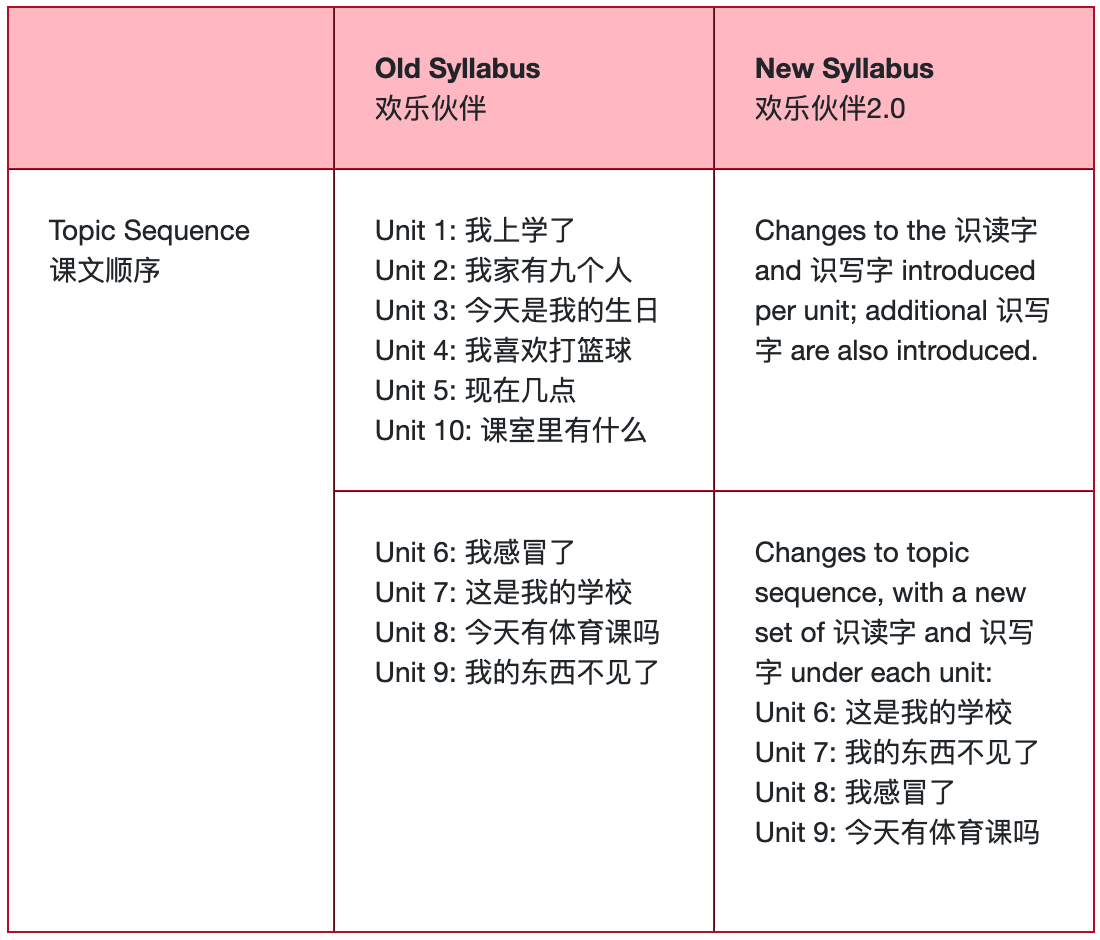
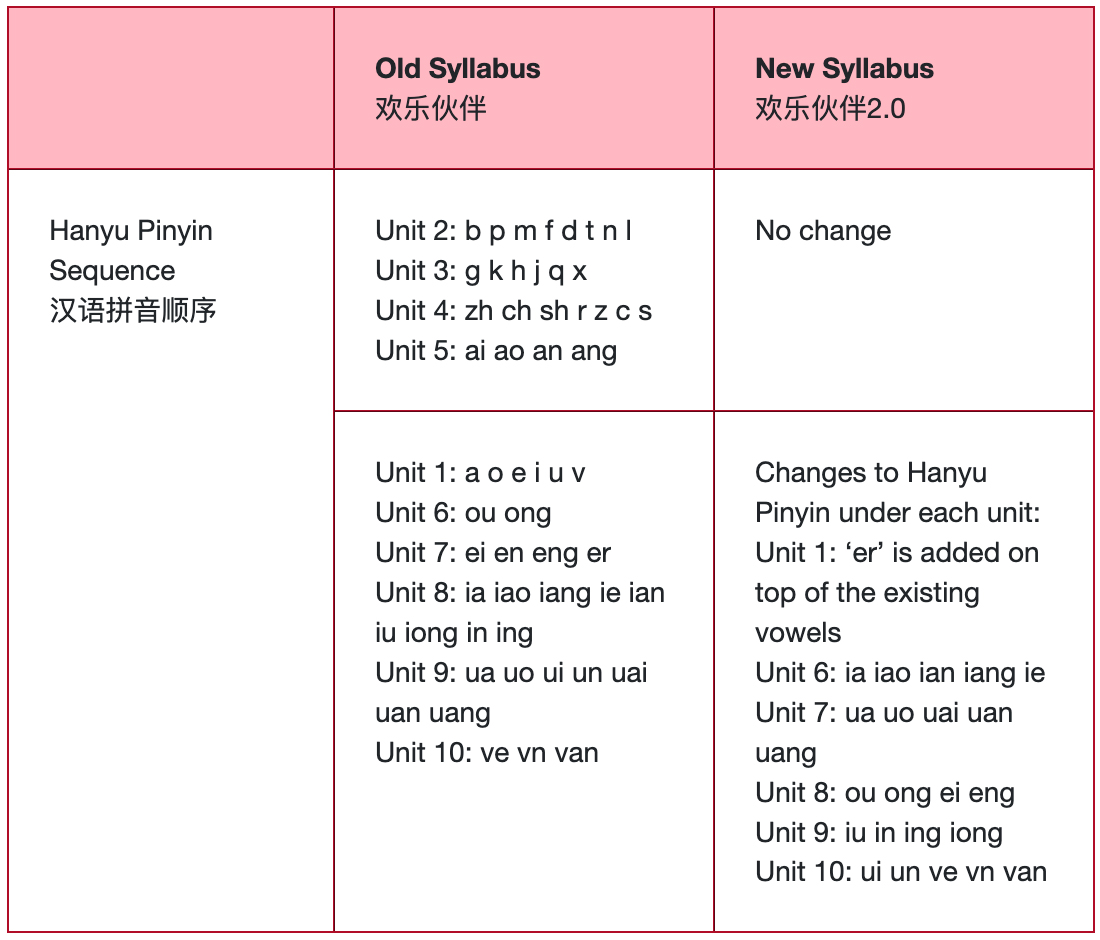
The new syllabus uses a multimodal approach to help pupils learn Chinese. This approach sees technology being integrated into the learning process, which encourages interactive reading and independent learning outside of school settings. To supplement your child’s learning, you may refer to several assessment books that are aligned to the new syllabus from Educational Publishing House, which include e-learning resources such as classroom-simulated audio for Listening Comprehension practices.
Nov 2023
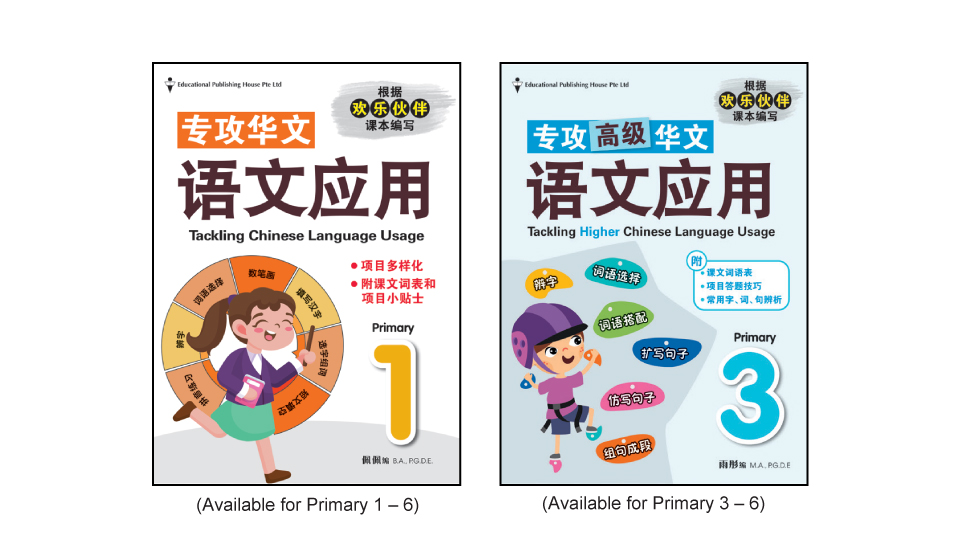
Let’s hear from experienced teachers on how to do well in Chinese Language Usage.
Nov 2023 | By EPH Editorial Team
Language Usage is a component tested in the Primary Chinese examination. With adequate practice and good preparation, pupils can score well for the component. Experienced teachers 刘璐滢老师, 佩佩老师 and 雨彤老师, authors of Tackling Chinese Language Usage ($10.90) and Tackling Higher Chinese Language Usage ($10.90), share with us some tips to excel in this component.
Q Why is it important to build a strong foundation in Chinese Language Usage?
刘老师: Questions testing pupils’ language usage skills have a rather high weightage in Chinese/ Higher Chinese Language Paper 2. Pupils’ overall grades will be pulled up if they are able to apply appropriate skills to derive the correct answer. A good grasp of language usage skills is also helpful when attempting comprehension questions as pupils will be able to better understand the passage and recognise what should be included in their answers.
Q How can parents and teachers support and encourage pupils in their learning of Chinese to boost language usage at home and in school?
佩佩老师: Parents can encourage their children to watch news reported in Chinese, read Chinese storybooks, and listen to Chinese songs. Parents can also model good Chinese language usage at home by communicating with each other in Chinese.
刘老师: Teachers can assign suitable reading tasks and practices to build a strong foundation and allow in-depth learning. Teachers can also provide timely feedback to pupils so that they are aware of their mistakes and areas for improvement.
Q Do you have any tips to score well in the Chinese Language Usage component?
雨彤老师: Practice makes perfect. Familiarising yourself with the vocabulary, questions, and examination format plays an integral part in scoring well.
刘老师: Revising the syllabus words is also important. Other than that, remember PUMPS:
P: Remember the Pinyin
U: Understand and differentiate the tested word(s) from similar ones
M: Remember the Meaning
P: Pair the word(s) with commonly associated words
S: Form Sentences using the word(s)
Q How does Tackling Chinese/ Higher Chinese Language Usage help pupils with examination preparation?
佩佩老师, 刘老师 & 雨彤老师: This series by Educational Publishing House is crafted based on the latest MOE curriculum and is closely aligned with current examination topics and question formats. It also offers effective answering strategies and revision word lists to help pupils tackle the examinations with confidence.
Customer Care
Retail Stores
Corporate Sales
About Us
Customer Care
Retail Stores
Members
Corporate Sales
Gift Voucher

© Copyright 2025 Popular Book Company Pte Ltd .197500612M All Rights Reserved.

